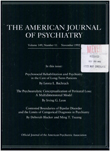Dysfunctional attitudes in depressed patients before and after clinical treatment and in normal control subjects
Abstract
To evaluate the role of maladaptive thinking patterns in depression, the authors administered the Dysfunctional Attitude Scale to 112 depressed patients before and after 3-6 weeks of treatment with antidepressants or placebo. Twenty-two normal subjects were also assessed twice. Depressed patients had a significantly higher initial mean score than control subjects, but during treatment their score significantly decreased, and the posttreatment score of those with complete recoveries was nearly as low as the control subjects' final score. The higher the initial dysfunctional attitude score the poorer the response to treatment. Patients with endogenous depression had significantly lower scores than nonendogenously depressed patients.
Access content
To read the fulltext, please use one of the options below to sign in or purchase access.- Personal login
- Institutional Login
- Sign in via OpenAthens
- Register for access
-
Please login/register if you wish to pair your device and check access availability.
Not a subscriber?
PsychiatryOnline subscription options offer access to the DSM-5 library, books, journals, CME, and patient resources. This all-in-one virtual library provides psychiatrists and mental health professionals with key resources for diagnosis, treatment, research, and professional development.
Need more help? PsychiatryOnline Customer Service may be reached by emailing [email protected] or by calling 800-368-5777 (in the U.S.) or 703-907-7322 (outside the U.S.).



